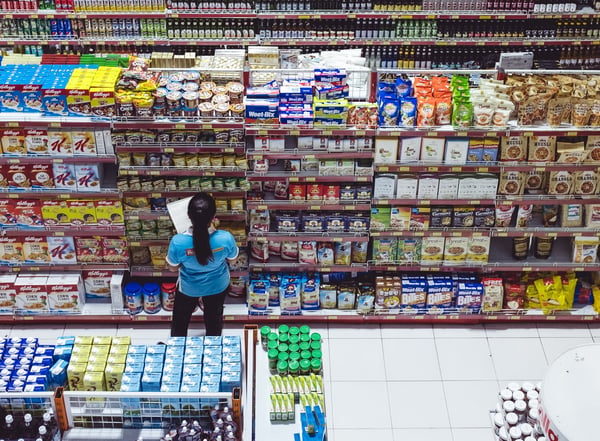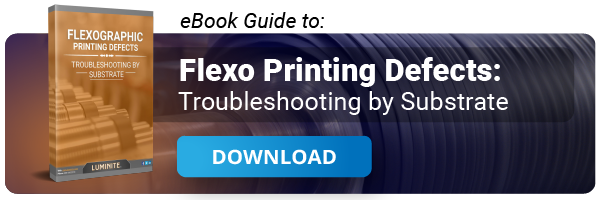Share this
Structural Packaging Definition and How It Applies To Flexo
by Luminite on Oct 23, 2020 10:48:29 AM

Yes, product packaging is meant to protect the product, but it does so much more than that. Today, good packaging serves as a marketing tool, helping certain products stand out on the store shelf and attract customers.
Store shelf space is competitive these days, and that makes package design all the more important. And it's structural packaging that plays a large role in any type of overall strategy.
In this post, we'll take a closer look at the importance of structural packaging and how flexo printing can support any overall packaging strategy.
Structural Packaging Definition
How do you differentiate your brand on the store shelf? Do you use generic packaging with default boxes that rely on mass automation and existing dies? Or do you use structural package designs to create something innovative and creative that stands out to the browsing consumer?
That's the definition of structural packaging - it's a modern-day package that serves as a marketing tool to maximize a brand's message and enhance the end user experience.
Structural packaging breaks packaging tradition to ensure your product packaging stands out and leaves an impression.
Consider some of these interesting structural packaging ideas:
- A clear plastic window in the packaging so the customer can see the product
- Packaging that tells a story
- A package that looks like the product (Think, apple-shaped apple juice bottles)
- Unique handles or convenience accessories
Structural Packaging and Flexo Printing
What does flexo printing have to do with structural packaging? A lot. Here's three ways this printing technology plays into an overall structural packaging strategy:
- 3D design for structural packaging
- Flexo printing on corrugated
- Flexo printing on labels
3D Design for Structural Packaging
Good structural packaging is a collaboration that involves:
- Graphic designers
- Color management specialists
- Print technicians
Designing a 3D package that can be printed on with flexo might seem like an insurmountable task, but it’s really not all that complicated. However, it’s important to work with a printer that has 3D capabilities and knows what they’re doing.
For example, a great deal of planning goes into a 3D design. There are certain margins, bends, and folds that need to be considered when designing a 3D project, and some printers only have 2D experience.
Flexo Printing on Corrugated
Flexo is among the most popular printing technology for corrugated substrates, whether it's via direct printing or pre-printing.
In order to successfully print on corrugated, however, there are a few different variables that need to be determined. These include:
- Ink
- Printing sleeves, cylinders, and/or plates
- Viscosity
Optimizing the presses for corrugated is critical otherwise you might crush the center flutes. However, if it's done right, flexo + corrugated = economical, fast, high-end structural packaging.
Flexo Printing for Labels
Since you can't exactly print right on glass or certain bottles, labels are a necessity for some products. That's where the likes of flexo printing sleeves and other flexo products can come in handy.
Just because you're working with a conventional glass bottle doesn't mean that you can't make it stand out on the store shelf.
2D printing on labels is a great way to create a large number of unique packaging solutions, and flexo does it quickly and efficiently.
Flexo Printing for Structural Packaging Solutions
Whether it's directly printing on the package itself or printing labels that are secured to the package, flexographic printing technology is an ideal all-around tool to help you achieve your packaging goals.
Want to learn more about the kinds of substrates you can print on with flexo? Check out our free guide!
Share this
- Flexographic Printing (81)
- Image Carrier (28)
- Elastomer sleeves (27)
- Ink Transfer (25)
- Quality (22)
- Flexo sleeve (20)
- News (18)
- printing defects (18)
- flexo printing defects (17)
- sustainability (13)
- Flexo Troubleshooting (12)
- Ink (12)
- Digital Printing (10)
- Flexo 101 (10)
- Flexo Inks, (9)
- Anilox (7)
- Blister Packaging (7)
- Cost (6)
- print misregistration (6)
- regulations (6)
- Corrugated Printing (4)
- pinholing (4)
- "Tradeshow (3)
- Digital Flexo (3)
- Gravure Printing (3)
- Insider (3)
- Load-N-Lok (3)
- Wide Web (3)
- direct laser engraving (3)
- flexo-equipment-accessories (3)
- gear marks (3)
- halo (3)
- testing (3)
- Narrow Web (2)
- bridging (2)
- feathering (2)
- filling in (2)
- mottled image (2)
- pressure (2)
- Labelexpo (1)
- dirty prints (1)
- doughnuts (1)
- embossing (1)
- kiss impression (1)
- October 2023 (2)
- September 2023 (1)
- August 2023 (1)
- July 2023 (3)
- June 2023 (1)
- May 2023 (5)
- April 2023 (1)
- March 2023 (2)
- February 2023 (1)
- January 2023 (3)
- December 2022 (1)
- October 2022 (3)
- September 2022 (2)
- August 2022 (2)
- July 2022 (3)
- May 2022 (1)
- April 2022 (4)
- March 2022 (2)
- February 2022 (5)
- January 2022 (7)
- December 2021 (1)
- November 2021 (3)
- October 2021 (2)
- September 2021 (1)
- August 2021 (1)
- July 2021 (3)
- June 2021 (1)
- May 2021 (4)
- April 2021 (4)
- March 2021 (4)
- February 2021 (2)
- December 2020 (1)
- November 2020 (1)
- October 2020 (2)
- September 2020 (1)
- August 2020 (3)
- July 2020 (2)
- June 2020 (3)
- May 2020 (1)
- April 2020 (1)
- November 2019 (3)
- October 2019 (1)
- August 2019 (1)
- July 2019 (1)
- April 2019 (1)
- March 2019 (1)
- January 2019 (1)
- October 2018 (2)
- August 2018 (1)
- July 2018 (1)
- June 2018 (1)
- February 2018 (2)
- October 2017 (1)
- September 2017 (2)
- January 2016 (1)
- February 2015 (1)
- January 2015 (1)
- December 2014 (2)
- September 2014 (1)
- February 2014 (1)
- January 2014 (1)
- December 2013 (3)
- October 2013 (1)
- September 2013 (1)
- June 2013 (1)
- January 2013 (1)


Comments (1)